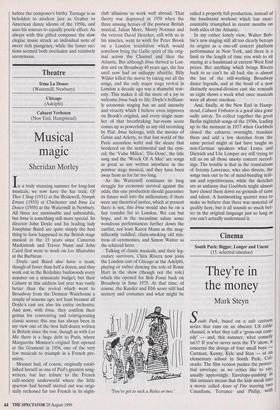Theatre
Irma La Douce (Watermill, Newbury) Chicago (Adc1phi) Cabaret Verboten (New End, Hampstead)
Musical magic
Sheridan Morley
In a truly stunning summer for long-lost musicals, we now have the hat trick: Of Thee I Sing (1931) at the Bridewell, Nymph Errant (1933) at Chichester and Irma La Douce (1958) at the Watermill in Newbury. All three are unmissable and unbeatable, but Irma is something still more special. Its director John Doyle and his leading lady Josephine Baird are quite simply the best thing to have happened to the British stage musical in the 15 years since Cameron Mackintosh and Trevor Nunn' and John Caird first went to work on Les Miserctbles at the Barbican.
Doyle and Baird also have a team, though of fewer than half a dozen, and they work out in the Berkshire backwoods every summer on a minuscule budget; but their Cabaret at this address last year was vastly better than the revival which went to Broadway from the Donmar Warehouse a couple of seasons ago, not least because all Doyle's cast are also his entire orchestra. And now, with Irma, they confirm their genius for reinventing and reinvigorating classic scores; this one has always been in my view one of the best half-dozen written in Britain since the war, though as with Les Mis there is a huge debt to Paris, where Marguerite Monnot's original first opened at the Gramont in 1956, one of the very few musicals to triumph in a French pre- mière.
Monnot had, of course, originally estab- lished herself as one of Piaf's greatest song- writers, but her tribute to the French cafe-society underworld where the little sparrow had herself started out was origi- nally reckoned far too French in its night- club allusions to work well abroad. That theory was disproved in 1958 when the three unsung heroes of the postwar British musical, Julian More, Monty Norman and the veteran David Heneker, still with us in his nineties, went to work for Peter Brook on a London translation which would somehow bring the Gallic spirit of the orig- inal across the Channel and then the Atlantic. But although Irma thrived in Lon- don and on Broadway 40 years ago, she has until now had an unhappy afterlife; Billy Wilder killed the movie by taking out all the songs, and the only major stage revival in London a decade ago was a shameful trav- esty. This makes it all the more of a joy to welcome Irma back to life; Doyle's brilliant- ly economic staging has an acid intensity and vivacity which I believe even improves on Brook's original, and every single num- ber of that breathtaking bar-room score comes up as powerfully as any old recording by Piaf. Irma belongs, with the movies of Gabin and Arletty, to that lost world of the Paris accordion waltz and the sleaze that bordered on the sentimental and the cyni- cal; the `Valse Milieu', `Dis-Donc', the title song and the 'Wreck Of A Mec' are songs as great as any written anywhere in the postwar stage musical, and they have been away from us for far too long.
As the Watermill continues its long struggle for economic survival against the odds, this one production should guarantee its future well into the millennium; if there were any theatrical justice, which at present there is not, this Irma would also be on a fast transfer list to London. We can but hope, and in the meantime salute some wondrous performances further down the castlist, not least Karen Mann as the mag- nificently raddled, chain-smoking old mis- tress of ceremonies, and Simon Walter as the schizoid hero.
Talking of classic musicals, and their leg- endary survivors, Chita. Rivera now joins the London cast of Chicago at the Adelphi, playing or rather dancing the role of Roxie Hart in the show (though not the role) which she opened for Bob Fosse back on Broadway in June 1975. At that time, of course, the Kander and Ebb score still had scenery and costumes and what might be 'You've got to nick a Rolex or two.' called a properly full production, instead of the bandstand workout which has unac- countably triumphed in recent months on both sides of the Atlantic.
In my rather lonely view, Walter Bob- bie's new staging still all too clearly betrays its origins as a one-off concert platform performance in New York, and there is a limit to the length of time you wish to sit staring at a bandstand at current West End prices. But anything which brings Rivera back to us can't be all bad; she is almost the last of the still-working Broadway dance legends, and at the head of a now distinctly second-division cast she reminds us eight shows a week what once musicals were all about: stardom.
And, finally, at the New End in Hamp- stead, Cabaret Verboten is a good idea gone sadly astray. To collect together the great Berlin nightclub songs of the 1930s, leading up to the moment in 1937 when Goebbels closed the cabarets overnight, translate them and add a few sketches from the same period might at last have taught us non-German speakers what Lenya and Dietrich and Ute Lemper are still trying to tell us on all those smoky concert record- ings. The trouble is that in the translations of Jeremy Lawrence, who also directs, the songs turn out to be of mind-bending tedi- um and repetitiveness, while the sketches are so unfunny that Goebbels might almost have closed them down on grounds of taste and talent. A hardworking quartet tries to make us believe that there was material of quality here, but it all sounds so much bet- ter in the original language just so long as you can't actually understand it.


























































 Previous page
Previous page